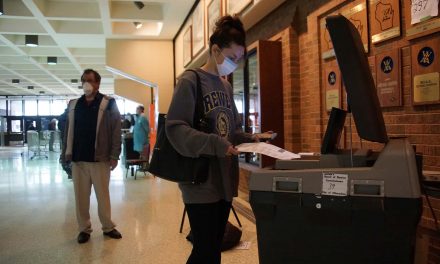
Months after lawmakers — and even the state’s top economic development strategist — thought it would be waning, COVID-19 still threatens Wisconsin, as its economy struggles to recover.
Industries are “reeling” and so are other sectors of the state that are critical to its long-term success: education, child care and health care. As grim as all that might sound, though, it has also given Wisconsin a chance to focus on important priorities, according to Missy Hughes, CEO and Secretary-designee of the Wisconsin Economic Development Corporation (WEDC).
“We have challenges in our economy that are longstanding,” Secretary Hughes told a group of legislators and staff last week. “This is an opportunity to say, ‘OK, how are we going to fix that? How are we going to move forward?’”
Wisconsin’s economic blow from the pandemic, and the prescription for getting back on its feet, are laid out in a report from the WEDC that the state Legislature commissioned in the spring and that the agency turned in on June 30. Secretary Hughes spoke Thursday, July 30, to about 40 legislators and staff members in an online briefing about the report. She also gave an update on WEDC’s response to the pandemic’s effects.
The report Wisconsin Tomorrow — An Economy for All offers three top priorities for survival. Get people back to work. Fix the state’s digital divide. Support innovation that can keep business flexible and resilient so jobs can begin to grow again.
“We need to be saying, ‘Yeah, we want to support our entrepreneurs, our startup businesses,’” Secretary Hughes said. “That’s the energy that we need in order to get past this moment of kind of spinning our wheels and really moving towards recovery in the economy.”
Secretary Hughes said that recovery is much farther off than either she or lawmakers expected when the Legislature, as part of the state’s COVID-19 relief bill enacted April 15, assigned the WEDC to produce the report on the pandemic’s impact on Wisconsin and its industries and the state’s recovery plan.
“Back in April, I think we all thought we would be moving through COVID-19, and by June 30, which is the date that was requested for the report, we would be well on our way towards recovery,” Secretary Hughes said. “As we all know right now, we are struggling to get to that moment of recovery. We are regaining momentum in our economy right now. But obviously that’s being impacted by the ongoing public health emergency that we’re experiencing.”
At the top of the report’s concerns is the continuing threat from COVID-19 to the health of Wisconsin residents — and to the state’s economic recovery.
“Absent effective public health measures, including a vaccine, the state’s economy cannot fully recover,” the report declared.
Pandemic’s sweeping impact
The pandemic’s impact on Wisconsin, as on the whole country, has been sweeping, its scope so broad that it takes time to fully assess and comprehend the toll, Secretary Hughes said.
“This is not a tornado or a flood that has touched down in one of our small towns or one of our counties, where we can dive in and understand the impact and act on it as quickly as possible,” she said.
WEDC’s response to the pandemic has led with three grant programs. From the agency’s own funds came $5 million for Small Business 2020. That program awarded grants averaging $8,900 a piece going to 763 businesses with 20 or fewer employees.
Another WEDC-funded program was $2.5 million for Ethnic Minority Emergency grants, $2,500 each for 888 micro-businesses. Target firms had five or fewer employees and were operated by people of color, immigrants and other minority group members — many of which weren’t eligible for the Small Business Administration’s Paycheck Protection Program (PPP).
From the Coronavirus Aid, Relief and Economic Security (CARES) Act, the agency is giving $75 million to about 30,000 small businesses that are receiving $2,500 each as part of the We’re All In program. Those businesses have 20 or fewer employees and $1 million or less in revenue. We’re All In encourages participating businesses to implement public health safety measures, including social distancing and masking, for employees and customers.
So far about 22,000 grants totaling $44 million have been approved, with another 10,000 to go. They can use the funds for “any kind of expenses” on things they need, she said, from new inventory as they reopen to personal protective equipment (PPE) “to make sure that their employees and their customers are safe.”
By themselves, the funds will not save a business that is on the verge of collapse, Secretary Hughes acknowledged, but taking part in the program could help connect them with larger networks of resources and support that they could rely on to help stay afloat.
“This is really about relief funding, and it’s about stimulating the economy,” said Secretary Hughes. “That was the intention behind the CARES Act. And so moving those dollars out is critically important.”
Studying Wisconsin’s economy has highlighted how important small business is to the state, said Secretary Hughes, with more than four out of five of the state’s half-million businesses qualifying as small, with 500 or fewer employees.
“We are a small business state, and really digging in and understanding who those businesses are … is really going to be critical moving forward,” Secretary Hughes said. “Wisconsin deserves it. The small businesses that have really taken the impact on this, the communities of color that have really taken the impact on this — they deserve our focused attention on moving forward.”
The complexity of the pandemic’s impact shows up in many ways, starting with the state’s unemployment statistics — “a monster change” from the pre-pandemic rate of about 3.5%. After spiking at 13.5% in April, it eased slightly to 12% in May, according to the WEDC report. Besides dwarfing other downturns going back decades, though, “we’re seeing something different with the unemployment in Wisconsin and nationwide,” Secretary Hughes said.
Services hit first, hardest
In the usual recession, even the Great Recession of 2008-2009, the job losses tend to start in manufacturing as factory workers get laid off, sending ripples through other economic sectors. The pandemic slowdown, however, started in the service industry — restaurants and retail stores — as public health measures to reduce gatherings in order to slow the spread of the virus forced those businesses to close their doors temporarily. With lower-skilled workers losing those jobs, strategies to reenergize the economy will have to be different, said Secretary Hughes.
The report assessed the impact that the pandemic has had on all of Wisconsin’s major industries, and concludes: “Many are still reeling.” Tourism, retail and services – if they are open at all – are operating in limited capacity and struggling to find customers. Agriculture, as well as the food and beverage industries, are having to anticipate and adjust to changes in markets and supply-chain disruptions.
Although less affected at the start, manufacturing and construction will likely slow down because of lower consumer spending and reduced capital. And forest products have had “perhaps the starkest divide,” the report states: record-high demand for some consumer paper goods (recall the toilet paper hoarding in the spring), while sharp declines in the catalog and magazine industry due to a fall-off in print advertising.
The report paints a broad canvas. It takes into account the impact that the economic shock of the pandemic had not only on business but on the larger communities in which they operate. That includes its effects on the state’s 11 tribal nations as well as on municipal governments and nonprofits. It also includes the effects on education, child care and health care — “three economic engines for the economy of Wisconsin,” said Secretary Hughes. All three suffered direct hits from the crisis.
The effects on education and people who work in that field — whether kindergarten teachers, college professors or countless support staff members — were enormous. “And they’re critical for our recovery,” Secretary Hughes said.
Even before the pandemic, the need for reliable and affordable child care had caught her attention. “I had had many conversations with manufacturers and businesses around the state who were saying that the access to child care is really starting to strain our ability to grow,” she said. “As COVID developed, it really became stark, and incredibly important.”
Priorities for the future
Compiling the report led WEDC to a broader vision for economic development in the state.
“Given the complexity of what we saw with the Wisconsin economy and the impact of COVID-19 … we feel it’s really important to think about developing and redeveloping the Wisconsin economy in a holistic manner, thinking about all the different things that that contribute to economic well being for an individual or for a family,” said Secretary Hughes.
Work is important, she said, but so are strong communities, including access to a healthy environment, solid community infrastructure and adequate health care in the community that includes care for children and for older members, too.
“Education is obviously critically important for economic well being,” she continued. “And being able to move from a low-skilled position to a high-skilled position is incredibly important.
At the same time, the current crisis requires focus, leading to WEDC’s three top priorities: reemployment, boosting broadband internet connectivity and fostering innovation. All grew naturally out of the pandemic experience, Secretary Hughes said.
“We actually have an opportunity to solve the workforce problem that we had back in January and February, with the low skilled workers that have become available on the marketplace,” Secretary Hughes said. “We need to think about how do we get those individuals the skills, how do we get them moving forward into family-sustaining jobs and help our industries now be able to grow. There’s an opportunity here.”
Working at home, remote schooling, the need for good internet access even just to hunt for a job all brought into sharp relief that need to “fix the broadband situation in Wisconsin.”
The impulse “to hunker down and wait it out and not take risks” gave rise to the decision to make innovation the third top priority. Wisconsin residents have already set an example for that, she added, with brewers and distillers switching off to make hand sanitizer and families and schools learning how to teach and learn and work online.
“The amount of change that we’ve experienced is invigorating,” added Secretary Hughes, “and it’s important to think about how to use that energy to propel Wisconsin forward.”
Lee Matz
Originally published on the Wisconsin Examiner as ‘How are we going to fix that? How are we going to move forward?’
Donate: Wisconsin Examiner
Help spread Wisconsin news, relentless reporting, unheard voices, and untold stories. Make a difference with a tax-deductible contribution to the Wisconsin Examiner














